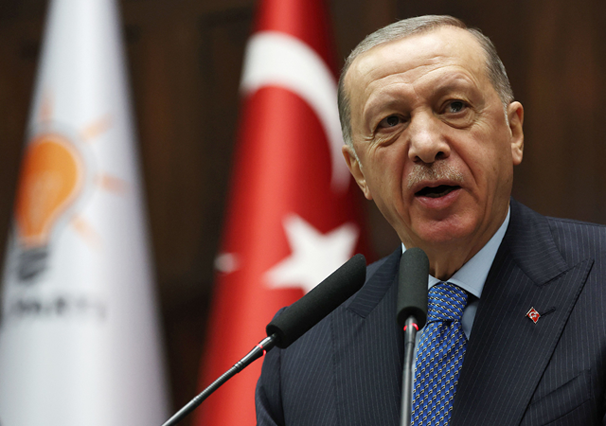You are here
Turkey hikes minimum wages for third time to cushion inflation
By AFP - Dec 22,2022 - Last updated at Dec 22,2022

Turkish President and leader of the Justice and Development Party Recep Tayyip Erdogan delivers a speech during his party's group meeting at Turkish Grand National Assembly in Ankara, on Wednesday (AFP photo)
ISTANBUL — Turkish President Recep Tayyip Erdogan on Thursday announced the third major minimum wage hike in a year to try and cushion the impact of a historic jump in consumer prices ahead of crunch elections.
More than 40 per cent of Turkey's workforce earns the lowest income allowed by law.
Erdogan relied on support from the working classes to rise to power nearly two decades ago — and will need it again to secure reelection in polls which are due by next June.
But Turkey's poor have been hit the hardest by an economic crisis that has seen the official annual inflation rate reach 85 per cent.
On Thursday the Turkish leader said the country would boost the monthly take-home pay to a minimum of 8,500 liras ($455).
The minimum wage stood at 2,826 liras in December 2021.
It was raised to 4,253 liras last January and then to 5,500 in July.
But an accompanying plunge in the lira's value means that the wage has been raised only fractionally in dollar terms in the past year.
'Unsustainable'
Turkey's latest economic crisis started when Erdogan — a lifelong opponent of high interest rates — pressured the central bank to bring down chronically high consumer prices by lowering borrowing costs.
Conventional economic theory urges policymakers to fight inflation by curbing demand and raising the price of doing business through higher interest rates.
Erdogan's approach set off a currency crisis that saw the lira lose nearly half its value in a matter of weeks late last year.
The government has responded by spending its reserves on currency support measures and imposing complex economic rules aimed at bringing inflation under control.
Erdogan promised on Thursday that inflation will slow to 20 per cent by the end of next year.
"We will witness a rapid decline of inflation rates starting this month," he said in televised remarks.
Analysts expect inflation to start falling sharply because the data will be compared to readings from a period 12 months ago when prices were soaring at breakneck pace.
But they also think it will remain substantially elevated until Erdogan either reserves course or a new government embraces economic orthodoxy.
The central bank on Thursday showed no signs of comprise by keeping its benchmark interest rate at 9 per cent.
Turkey's official inflation reading of 84.39 per cent means that banks lose 75.39 per cent of a loan's value if they lend money for a year at the official interest rate.
This threatens to cripple lending and dramatically slow economic growth.
"Economic growth will continue to slow in the first half of next year, and it's very possible that President Erdogan puts pressure on the [central bank] to loosen policy even more ahead of next year's election," Nicholas Farr of Capital Economics wrote in a note to clients.
Attempts to force Turkish exporters to sell dollars "and foreign financing have helped stabilise the currency in recent months, but this is unsustainable and we are forecasting it to fall by around 20 per cent against the dollar by end-2023," Farr said.
Related Articles
Energy consumption falls, tourism brings in foreign currencies during summerQUOTE: Education, housing, health, and hotel and restaurants saw
ISTANBUL — Turkey's annual inflation rate fell to 71.6 per cent in June, official data showed on Wednesday.Consumer prices began slowing aft
ISTANBUL — Inflation in Turkey in June soared to an annual rate of 78.6 per cent — the highest in 24 years, according to official data relea











